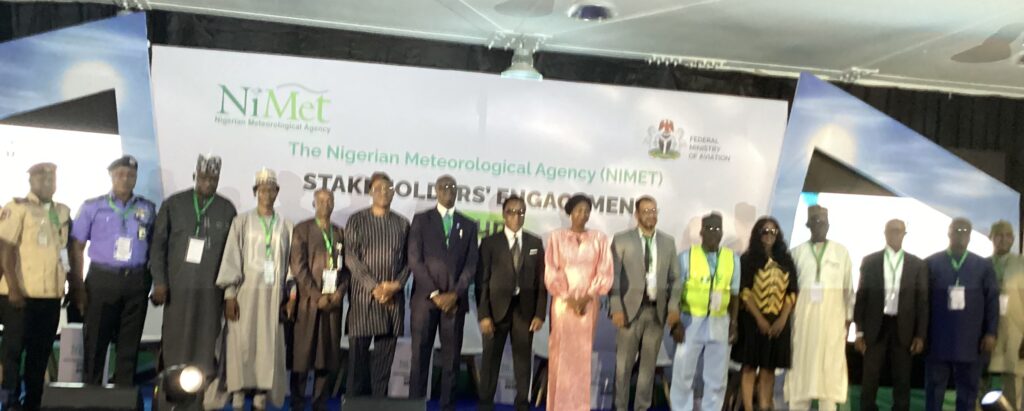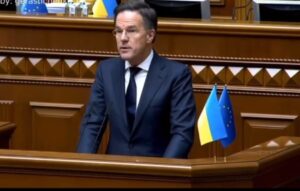NiMet launches first-ever stakeholders’ forum to strengthen climate risk awareness

Abdullateef Fowewe
The Nigerian Meteorological Agency (NiMet) has launched the first-ever stakeholders’ forum to strengthen climate risk awareness and early action.
Speaking at the Stakeholders’ Forum held in Naval Dockyard, Victoria Island, on Wednesday the Director-General/Chief Executive Officer of NiMet, Professor Charles Anosike, underscored the agency’s commitment to enhancing climate resilience through early warnings and collaborative action.
The two-day engagement which starts on Wednesday, themed “Early Warnings: Raising Awareness on Climate Risks and Promoting Early Action,” marked a historic milestone for NiMet as it seeks to deepen public engagement and improve the impact of its weather and climate services.
Professor Anosike welcomed stakeholders, saying, “This Forum is aimed at creating a platform for us to share our progress, collaborate, raise awareness, listen to your feedback, co-create solutions and act towards building a climate-resilient Nigeria.”
Highlighting NiMet’s pivotal role, he explained that the agency serves all socioeconomic sectors by “observing, collating, processing, and disseminating weather and climate information for the safety of lives and property as well as sustainable development.”
Anosike noted the essential weather data supports flight safety and operational efficiency disclosing that NiMet has gone digital with tools like the Electronic Flight Folder, offering virtual flight briefings.
The agency has also achieved ISO certification for five airports, including Lagos and Abuja, aiming to expand the list.
He further revealed that NiMet has collaborated with national agencies like NEMA and NIMASA to mitigate weather-related disasters and support sustainable growth in the marine and blue economy sectors.
On infrastructure and technology, Anosike revealed transformative upgrades including multi-model forecasting, in-house technology Meteowiz for real-time data transmission, and new meteorological equipment provided through partnerships and government support.
He stressed the importance of collaboration stressing, “Whatever we have done or achieved, we have done so with the active collaborations, partnerships and support from our stakeholders.”
Emphasising sustainability, he called for continued investments to maintain and expand services beyond government funding.
Concluding, Professor Anosike reminded attendees, “Early warnings must not end with the forecast alone. They must inspire understanding and drive decisive action,” urging all stakeholders to engage actively in building a resilient Nigeria amid climate challenges.
In his remark, Vice President Kashim Shettima who was represented by Inna B. Audu, Special Adviser to the President on Humanitarian Affairs and Development Partners, highlighted the pressing challenge of escalating climate hazards.
Shettima stated, “The growing frequency and intensity of weather and climate hazards pose a significant threat to our national development goals, livelihoods, and the well-being of our communities.”
Emphasising the critical role of early warning systems, the Vice President called for a coordinated and proactive approach to managing climate risks, urging stakeholders to integrate accurate, timely weather information from the Nigerian Meteorological Agency into all sectors.
He noted, “Early warning systems are not merely technical tools, they are life-saving mechanisms. However, for early warnings to lead to early action, the messages must be accessible, understandable, and usable by decision-makers at all levels.”
He thereby encouraged collaboration and capacity-building, adding, “By integrating NiMet’s products and services into our sectoral plans, we not only enhance preparedness but also support sustainable development.”
The Managing Director of Nigerian Airspace Management Agency (NAMA), Farouk Umar, represented by Tayo John, while speaking underscored the urgent need for climate action.
Speaking on behalf of Umar, John said, the forum “could not have come at a better time” given the grave impacts of global warming like rising sea levels, extreme weather, and health risks.
He detailed the aviation sector’s vulnerabilities, including “increased turbulence,” “flight delays and cancellations,” and “airport infrastructure damage” from climate change.
Urging collaboration, Umar called for “workable solutions” to climate challenges and stressed the responsibility of professionals to prevent “disasters on the ground or in the air.”
He concluded with a plea for “well-tailored resolutions that would move our nations forward.”




